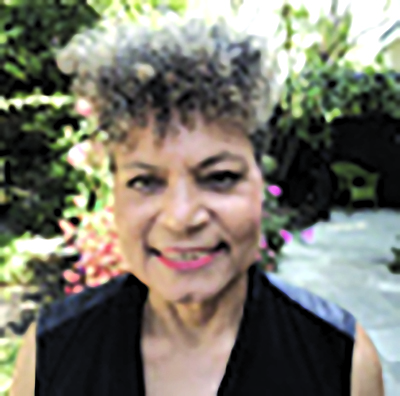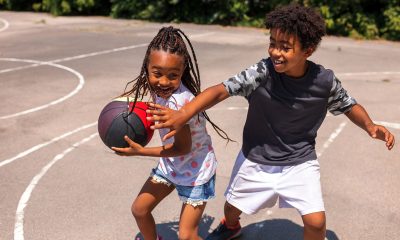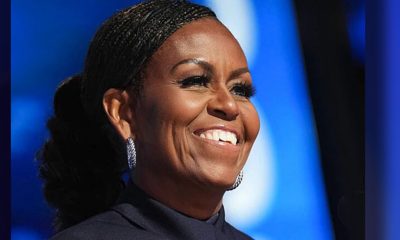Arts and Culture
Self-Love: The Greatest Love of All

February is a powerful month in the African-American psyche. It is Black History Month, and it includes Valentine’s Day. This is a time when we could focus both on loving and respecting ourselves and loving and appreciating our ancestry. We are a resilient people who have survived and thrived despite all efforts to extinguish us. There are forces at work which seek to degrade, humiliate and destroy us—and still, we persevere.
As Black psychologists, we are charged with helping our people achieve optimal mental health and wellness. How do we do that in a society wherein the powers that be have strategized to maintain their supremacy and our powerlessness? We must develop a love so strong that it cannot be overtaken by the opinions of those who would seek to defeat us.
During this month, we honor both our ancestors and those who are living who help to instill in us a sense of pride of being.
There are many notables who do this for us. Traditionally, we have honored Harriet Tubman, Dr. Martin Luther King, Jr., Nelson Mandela, Malcolm X and so many others. Today, we look to President Obama, his Queen Michelle, Congressperson Barbara Lee and countless others. On a more personal level, our mothers, fathers, grandparents, and our children model for us and give us reasons for being.
As Black psychologists, we care for the individual, the family, and the community. We do not need to follow traditions born of the dominant culture in order to cultivate our mental health. We must conceptualize our understandings of our mental health needs through principles that are steeped in our roots.
In ancient African beliefs, we come to love ourselves through our love of spirit, of other people, and of nature. Oshun, the Yoruba goddess of love, is proud of how we honor her by honoring one another. In African-Centered/Black Psychology and Spirituality, self is not defined as separate and individualized, but as an extension into others. We are part of the collective; we are interdependent and inescapably connected to each other.
Self-love is the love of being connected to and interlaced with the best in one another. Black self-love is an act of liberation from the hostile and negative influences of the culture in which we live. We express it through our art, music, dance, song, creativity, and storytelling. Historically, our music, dance, and songs have served as tools to remind us of what it means to be alive, to be spiritually aligned, and mentally well.
A demonstration is our beloved ancestor Whitney Houston’s anthem “The Greatest Love of All.” The lyrics of this classic rhythm and blues song are an expression of the importance of self-love:
“I believe the children are our future
Teach them well and let them lead the way
Show them all the beauty they possess inside
Give them a sense of pride to make it easier
Let the children’s laughter remind us how we used to be
I decided long ago never to walk in anyone’s shadow
If I fail, if I succeed at least I lived as I believe.
No matter what they take from me, they can’t take away my dignity
Because the greatest love of all is happening to me
I found the greatest love of all inside of me
Learning to love yourself…It is the greatest love of all.”
The singing, chanting, and understanding of this classic song reminds us that no one and no thing outside of ourselves can validate our worth. This is an inside job.
In America, we live in a culture that does not support our humanity, much less our self-worth. We have learned to cope in this society by relying on our deep inner sense of knowing and our willingness to express ourselves.
To be healthy, it is important that we remember that we are valuable and worthy of love, because we exist. Ancient African wisdom teaches us that we are spiritual people. We can decide to live a more joyful and Oshun-filled life by harnessing our spiritual, mental, physical, and emotional energies to assist us. There are everyday things, beyond Black History Month, that we can do for ourselves and our loved ones to support our understanding and knowing that we are worthy of love. Below you will find some strategies to support you.
Face each day with an attitude of gratitude. Focus on the good in you and in your life. Forgive your imperfections. Don’t give irrational ideas power. Example: “No one will ever love me.” Shift your attitude and self-talk. “I really love how well I get along with people.” Accept and appreciate yourself. Be gentle with your criticism. Assert yourself. Avoid taking on the burdens of others. Care, but do not carry. Embrace change. Cultivate a sense of mastery and control by setting goals and by working to attain them. Manage your time effectively. Take time to nurture yourself.
Engage in deep breathing. The single most relaxing thing you can do is deep relaxation. Visualize yourself in a peaceful place. Acupuncture and acupressure are helpful. Eat healthy foods. Exercise regularly and have a massage. Develop and use support systems: family, friends, coworkers. Give to others. It broadens your view and shifts your focus. Use support groups when facing challenging situations. Commune with the Universal Spirit with prayer and meditation. Live your higher beliefs. Connect with people who share your beliefs. Read inspirational materials. Worship with your spiritual (religious) systems.
During this month of love and remembrance, know that we are healthiest when we have a loving, giving spirit that connects similar spirits. Walk through life celebrating that our love of self through others is the Greatest Love of All.
This article is dedicated to the ambassador of Black love: Dr. Lige Dailey, Jr.
*The Association of Black Psychologists, Bay Area Chapter (ABPsi-Bay Area) is committed to providing the Post Newspaper readership with monthly discussions about critical issues in Black Mental Health. The ABPsi-Bay Area is a healing resource. We can be contacted at (bayareaabpsi@gmail.com) and readers are welcome to join with us at our monthly chapter and board meeting, every third Saturday at the West Oakland Youth Center from 10 a.m. – 12 noon.
Advice
BOOK REVIEW: Let Me Be Real With You
At first look, this book might seem like just any other self-help offering. It’s inspirational for casual reader and business reader, both, just like most books in this genre. Dig a little deeper, though, and you’ll spot what makes “Let Me Be Real With You” stand out.

By Terri Schlichenmeyer
Author: Arshay Cooper, Copyright: c.2025, Publisher: HarperOne, SRP: $26.00, Page Count: 40 Pages
The hole you’re in is a deep one.
You can see the clouds above, and they look like a storm; you sense the wind, and it’s cold. It’s dark down there, and lonesome, too. You feel like you were born there — but how do you get out of the deep hole you’re in? You read the new book “Let Me Be Real With You” by Arshay Cooper. You find a hand-up and bring someone with you.
In the months after his first book was published, Cooper received a lot of requests to speak to youth about his life growing up on the West Side of Chicago, his struggles, and his many accomplishments. He was poor, bullied, and belittled, but he knew that if he could escape those things, he would succeed. He focused on doing what was best, and right. He looked for mentors and strove to understand when opportunities presented themselves.
Still, his early life left him with trauma. Here, he shows how it’s overcome-able.
We must always have hope, Cooper says, but hope is “merely the catalyst for action. The hope we receive must transform into the hope we give.”
Learn to tell your own story, as honestly as you know it. Be open to suggestions, and don’t dismiss them without great thought. Know that masculinity doesn’t equal stoicism; we are hard-wired to need other people, and sharing “pain and relatability can dissipate shame and foster empathy in powerful ways.”
Remember that trauma is intergenerational, and it can be passed down from parent to child. Let your mentors see your potential. Get therapy, if you need it; there’s no shame in it, and it will help, if you learn to trust it. Enjoy the outdoors when you can. Learn self-control. Give back to your community. Respect your financial wellness. Embrace your intelligence. Pick your friends and relationships wisely. “Do it afraid.”
And finally, remember that “You were born to soar to great heights and rule the sky.”
You just needed someone to tell you that.
At first look, this book might seem like just any other self-help offering. It’s inspirational for casual reader and business reader, both, just like most books in this genre. Dig a little deeper, though, and you’ll spot what makes “Let Me Be Real With You” stand out.
With a willingness to discuss the struggles he tackled in the past, Cooper writes with a solidly honest voice that’s exceptionally believable, and not one bit dramatic. You won’t find unnecessarily embellished stories or tall tales here, either; Cooper instead uses his real experiences to help readers understand that there are few things that are truly insurmountable. He then explains how one’s past can shape one’s future, and how today’s actions can change the future of the world.
“Let Me Be Real With You” is full of motivation, and instruction that’s do-able for adults and teens. If you need that, or if you’ve vowed to do better this coming year, it might help make you whole.
Alameda County
Bling It On: Holiday Lights Brighten Dark Nights All Around the Bay
On the block where I grew up in the 1960s, it was an unwritten agreement among the owners of those row homes to put up holiday lights: around the front window and door, along the porch banister, etc. Some put the Christmas tree in the window, and you could see it through the open slats of the blinds.

By Wanda Ravernell
I have always liked Christmas lights.
From my desk at my front window, I feel a quiet joy when the lights on the house across the street come on just as night falls.
On the block where I grew up in the 1960s, it was an unwritten agreement among the owners of those row homes to put up holiday lights: around the front window and door, along the porch banister, etc. Some put the Christmas tree in the window, and you could see it through the open slats of the blinds.
My father, the renegade of the block, made no effort with lights, so my mother hung a wreath with two bells in the window. Just enough to let you know someone was at home.
Two doors down was a different story. Mr. King, the overachiever of the block, went all out for Christmas: The tree in the window, the lights along the roof and a Santa on his sleigh on the porch roof.
There are a few ‘Mr. Kings’ in my neighborhood.
In particular is the gentleman down the street. For Halloween, they erected a 10-foot skeleton in the yard, placed ‘shrunken heads’ on fence poles, pumpkins on steps and swooping bat wings from the porch roof. They have not held back for Christmas.
The skeleton stayed up this year, this time swathed in lights, as is every other inch of the house front. It is a light show that rivals the one in the old Wanamaker’s department store in Philadelphia.
I would hate to see their light bill…
As the shortest day of the year approaches, make Mr. King’s spirit happy and get out and see the lights in your own neighborhood, shopping plazas and merchant areas.
Here are some places recommended by 510 Families and Johnny FunCheap.
Oakland
Oakland’s Temple Hill Holiday Lights and Gardens is the place to go for a drive-by or a leisurely stroll for a religious holiday experience. Wear a jacket, because it’s chilly outside the Church of Jesus Christ of Latter-day Saints, at 4220 Lincoln Ave., particularly after dark. The gardens are open all day from 9 a.m. to 9 p.m. with the lights on from dusk until closing.
Alameda
Just across the High Street Bridge from Oakland, you’ll find Christmas Tree Lane in Alameda.
On Thompson Avenue between High Street and Fernside drive, displays range from classic trees and blow-ups to a comedic response to the film “The Nightmare Before Christmas.” Lights turn on at dusk and can be seen through the first week in January.
Berkeley
The Fourth Street business district from University Avenue to Virginia Street in Berkeley comes alive with lights beginning at 5 p.m. through Jan. 1, 2026.
There’s also a display at one house at 928 Arlington St., and, for children, the Tilden Park Carousel Winter Wonderland runs through Jan. 4, 2026. Closed Christmas Day. For more information and tickets, call (510) 559-1004.
Richmond
The Sundar Shadi Holiday Display, featuring a recreation of the town of Bethlehem with life-size figures, is open through Dec. 26 at 7501 Moeser Lane in El Cerrito.
Marin County
In Marin, the go-to spot for ‘oohs and ahhs’ is the Holiday Light Spectacular from 4-9 p.m. through Jan. 4, 2026, at Marin Center Fairgrounds at 10 Ave of the Flags in San Rafael through Jan. 4. Displays dazzle, with lighted walkways and activities almost daily. For more info, go to: www.marincounty.gov/departments/cultural-services/department-sponsored-events/holiday-light-spectacular
The arches at Marin County Civic Center at 3501 Civic Center Dr. will also be illuminated nightly.
San Francisco
Look for light installations in Golden Gate Park, chocolate and cheer at Ghirardelli Square, and downtown, the ice rink in Union Square and the holiday tree in Civic Center Plaza are enchanting spots day and night. For neighborhoods, you can’t beat the streets in Noe Valley, Pacific Heights, and Bernal Heights. For glee and over-the-top glitz there’s the Castro, particularly at 68 Castro Street.
Livermore
The winner of the 2024 Great Light Flight award, Deacon Dave has set up his display with a group of creative volunteers at 352 Hillcrest Avenue since 1982. See it through Jan. 1, 2026. For more info, go to https://www.casadelpomba.com
Fremont
Crippsmas Place is a community of over 90 decorated homes with candy canes passed out nightly through Dec. 31. A tradition since 1967, the event features visits by Mr. and Mrs. Claus on Dec. 18 and Dec. 23 and entertainment by the Tri-M Honor Society at 6 p.m. on Dec. 22. Chrippsmas Place is located on: Cripps Place, Asquith Place, Nicolet Court, Wellington Place, Perkins Street, and the stretch of Nicolet Avenue between Gibraltar Drive and Perkins Street.
Activism
Oakland Mandala: A New Event and Point of Beauty
Led by Oakland resident Mandisa Snodey, a group of artists conceived and painted the mandala on Linden street near McClymonds High School as part of a Black Friday event the day after Thanksgiving to support Black-owned businesses.

By Post Staff
The first annual Oakland Mandala, sponsored by Miges Odanes Village Center, Credo Studio, and the Mandala Medicine Movement is on view now until the winter rains wash it away.
Led by Oakland resident Mandisa Snodey, a group of artists conceived and painted the mandala on Linden street near McClymonds High School as part of a Black Friday event the day after Thanksgiving to support Black-owned businesses.
“This is a lineage-based community art project, using temporary paint, aimed at community building, neighborhood beautification, and celebration of the arts and all people’s creativity,” Snodey said. “The theme of this year’s mandala was ‘Unified Humanity.’
“We gathered at 7 a.m. on Friday for the Black Friday Block Party and finished painting close to sunset. Our youngest painter was 2 years old and our eldest close to 70 years young: we had families, community members, professional artists, and people who have never painted before all working together.”
Snodey urges residents to come visit and take a picture with the mandala. It’s located between 28th and 30th on Linden Street in West Oakland. If you post on social media, please use the hashtags “#oaklandmandala” and “#mandalamedicinemovement.”
Snodey extends special thanks to the Bay Area Mural Program (BAMP), Few and Far Women, “and other Bay Area Artists who participated and made this first annual mandala a beautiful success.”
-

 Bay Area3 weeks ago
Bay Area3 weeks agoPost Salon to Discuss Proposal to Bring Costco to Oakland Community meeting to be held at City Hall, Thursday, Dec. 18
-

 Activism3 weeks ago
Activism3 weeks agoMayor Lee, City Leaders Announce $334 Million Bond Sale for Affordable Housing, Roads, Park Renovations, Libraries and Senior Centers
-

 Activism4 weeks ago
Activism4 weeks agoOakland Post: Week of December 10 – 16, 2025
-

 Activism3 weeks ago
Activism3 weeks agoOakland School Board Grapples with Potential $100 Million Shortfall Next Year
-

 Arts and Culture3 weeks ago
Arts and Culture3 weeks agoFayeth Gardens Holds 3rd Annual Kwanzaa Celebration at Hayward City Hall on Dec. 28
-

 Activism3 weeks ago
Activism3 weeks ago2025 in Review: Seven Questions for Black Women’s Think Tank Founder Kellie Todd Griffin
-

 Advice3 weeks ago
Advice3 weeks agoCOMMENTARY: If You Don’t Want Your ‘Black Card’ Revoked, Watch What You Bring to Holiday Dinners
-

 Activism3 weeks ago
Activism3 weeks agoAnn Lowe: The Quiet Genius of American Couture


























































